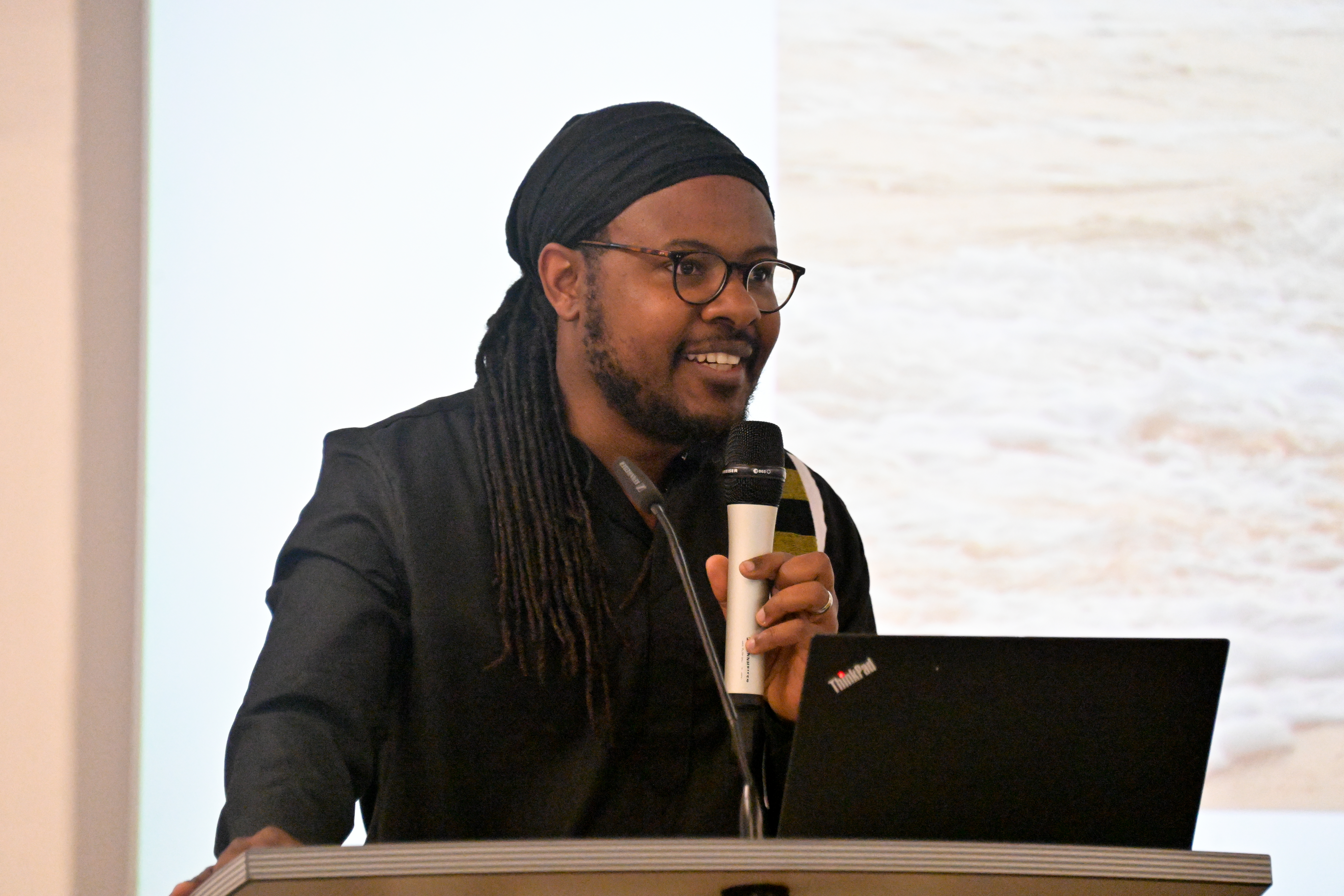News
Workshop: From Oblivion to Memory: Transatlantic Memorial Echoes
11.06.2025
To set the stage for the eponymous exhibition entitled From Oblivion to Memory: Transatlantic Memorial Echoes, a workshop was organised on 12 May 2025 at Iwalewahaus, University of Bayreuth, as part of the Black Atlantic Revisited project.
The event aimed to foster transatlantic debates on memories of the slave trade, bringing together voices from Africa, Latin America, and Europe to discuss the complex cultural connections that link these regions through the afterlives of the slave trade. Rather than treating memory as something fixed or monumental, participants explored it as fluid, fragmented, embodied, retold, and reimagined across time and space. The workshop brought together artists, performers, academics and writers, creating space for examining memory practices and their contemporary resonances.
The Workshop adopted an interdisciplinary approach with participants from various fields to foster dialogue on transatlantic memory. Contributors included Eberhard Rothfuss, who provided theoretical frameworks for understanding relational spaces; Colombian choreographer Lobadys Pérez, who explored embodied memory through performance; Brazilian artist Hugo Canuto, known for his work on Afro-Brazilian cosmologies in comic form; literary scholar Ute Fendler, who examined drawing as a gesture of memory; Togolese novelist Kangni Alem, who presented insights from his literary trilogy on the Bight of Benin and Brazil; and Thierry Boudjekeu, who anchored discussions in oral narratives from Ouidah.
Through presentations, performance-lectures, visual analysis, and discussions of literary works and oral narratives, conversations centred on modes of approaching transatlantic memory, new approaches to understanding the Black Atlantic as lived reality, and interconnections between commemorative practices across continents. The opening session, "Thinking Relational Spaces," moderated by Gilbert Ndi Shang, examined how we understand the Black Atlantic today, not just as a historical formation, but as a lived and felt reality that continues to resonate.
Thinking relational spaces
Eberhard Rothfuss proposed approaching the Black Atlantic not as a map of routes, but as a "felt space" charged with atmospheres of memory. Drawing on Gernot Böhme’s aesthetics and Alfred Schutz’s social theory, he emphasised that cities like Salvador da Bahia are more than locations; they are emotional and sensory nodes where the weight of history still resonates in everyday life. Lobadys Pérez responded through a performance-lecture blending movement and narrative, demonstrating how dance becomes resistance against the epistemic violence of modernity. For Pérez, dancing in the Afro-Caribbean tradition creates space to breathe, move, and remake memory rather than simply reclaiming an "authentic" past.
Memory in lines and movement
The second session, "Memory in Lines and Movement," moderated by Thierry Boudjekeu, examined what happens when memory moves through visual media, particularly comics and drawing. Hugo Canuto explained how Afro-Brazilian cosmologies are reshaped through comic book storytelling in his work Tales of the Orishas, treating this medium as political and cultural intervention that re-maps power, gives voice to silenced traditions, and creates new myths. Ute Fendler extended this analysis by examining how the act of drawing itself becomes a gesture of memory, drawing on Vilém Flusser's theory of gestures to argue that drawing functions as a way of thinking, remembering, and imagining otherwise.
Rewriting trauma, rebuilding connections
The final session, "Rewriting Trauma, Rebuilding Connections," moderated by Laude Ngadi, shifted to literature and oral storytelling as tools for reworking the slave trade's legacy. Kangni Alem offered insights into his long-term literary project, a trilogy tracing the entangled histories of the Bight of Benin and Brazil. From Esclaves, Les Enfants du Brésil to the forthcoming Olympio, his work demonstrates how fiction can capture what history tends to flatten: the emotional, moral, and symbolic tensions of people caught in slavery and modernity's machinery. Thierry Boudjekeu anchored the conversation in Ouidah, a historic slave port that continues to speak through a plurality of memories, demonstrating how oral narratives and their literary representation (inter)act as counter-archives that question, correct, and push literature to absorb their layered, fragmented truths.
The workshop mapped out a web of memory practices, some rooted in the body, others in images or stories that reach across the Atlantic. What connected the sessions was a shared refusal to treat memory as something already given, with participants embracing memory as an unfinished process continually negotiated between oblivion and resistance, loss and creation.
As preparation for the exhibition, the workshop demonstrated that remembering the Black Atlantic involves not just looking back but rethinking the present, reclaiming space, and imagining new futures across spatialities and medialities. The discussions contributed to ongoing debates about memorial practices and their role in contemporary cultural expression, establishing the conceptual foundation for the exhibition that followed.
See the programme of the workshop here https://www.africamultiple.uni-bayreuth.de/en/Important-Dates/2025-05-12_Workshop/index.html
Text:Thierry Boudjekeu and Laude Ngadi







